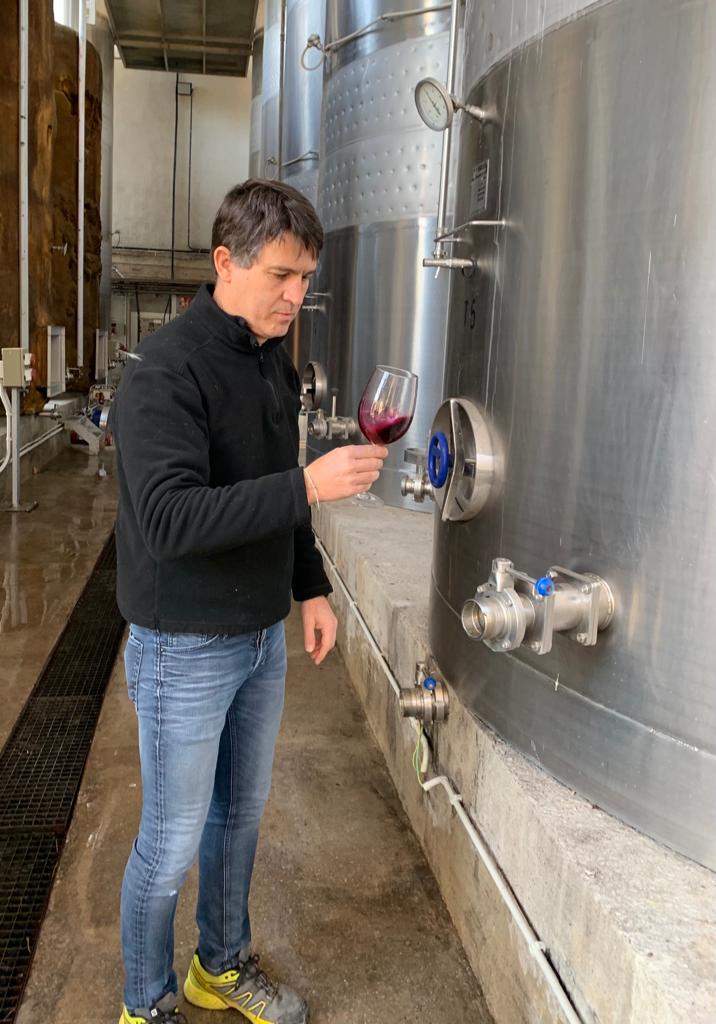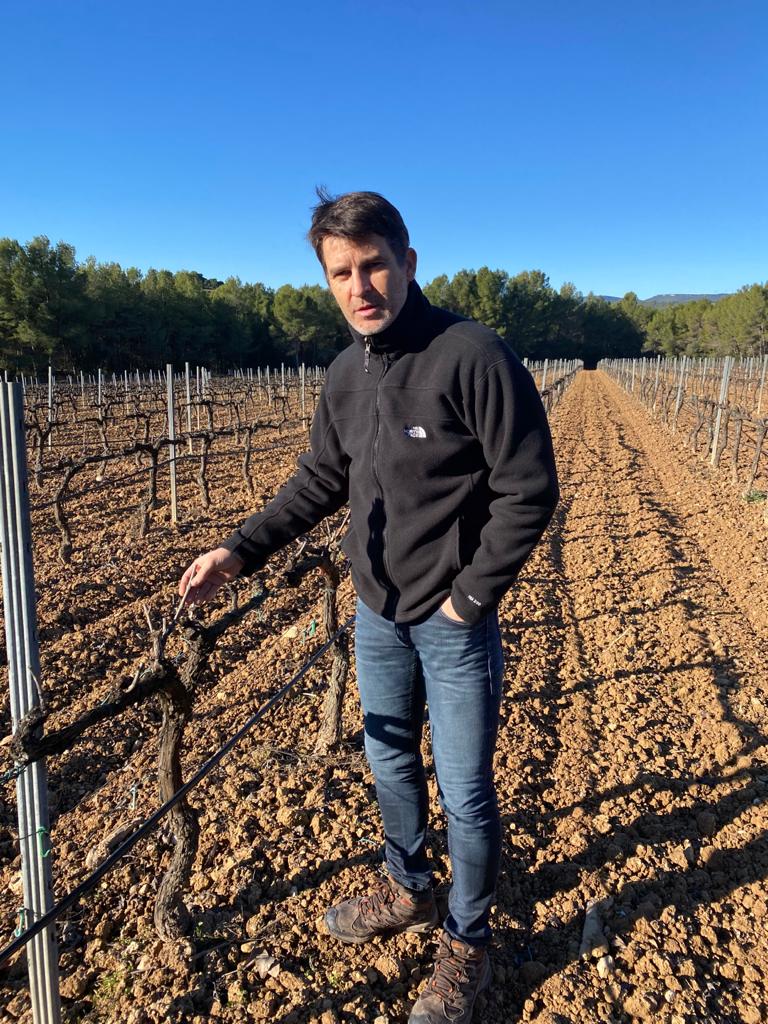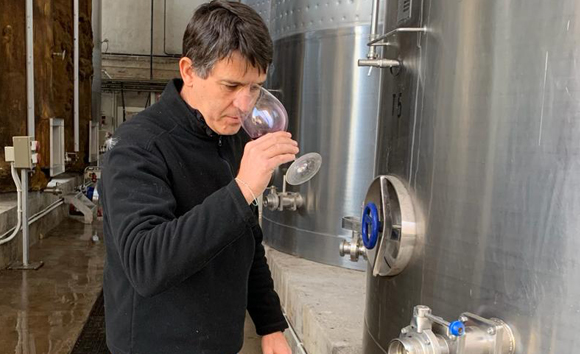We have had a very interesting conversation with Lluís Esclassans, our winemaker. Talking with him about the past, present and future of Caves Naveran is a real pleasure. Lluís is part of our Naveran family, he has been with us almost from the beginning! He started very young, more than 30 years ago, as a winemaker and is currently the technical director and main winemaker of our estate. He is a restless person with many ideas. He is very clear about the challenges and the DNA of Cavas Naveran. We have talked with him about all this through a conversation that revolves around 5 questions. And here we leave them!
Naveran cavas have a lot of personality. Despite being made in the Penedès and, without a doubt, carrying this DNA inside, we find many influences from Champagne: in the coupages, in the use of varieties such as Chardonnay and Pinot Noir, the monovarietal cavas that are so difficult to obtain… Where does this influence come from? And, on the other hand, is it difficult to integrate it into such a “charismatic” wine region with such deep-rooted traditions?
Michel founded Cavas Naveran in 1984 on Finca Can Parellada, which he had inherited from his grandfather. For years here (in Can Parellada) the native varieties of Penedès had been planted, such as macabeu, xarel lo, parellada, ull de llebre… And of course, at the time that Michel created the company and we began to produce wines and cavas with the Naveran brand there were many old vineyards and they had to replant.
It was then that Michel decided to introduce foreign varieties and the first was chardonnay. He is Swiss, but he has a lot of French influences and has traveled many times to champagne, he has colleagues there and that’s why we opted for chardonnay. Somewhat later the Pinot Noir variety was planted, when it was not yet regularized by the Consell Regulador del Cava.
In those years, there was a controversy between cava producers who defended that it should only be made with native varieties or, and here we positioned ourselves, among those who thought that if a foreign variety improved cava, why not introduce it. In the end, both varieties were regularized and, today, in the Penedès there are wineries that make wines and cavas with them. However, we do not want to give up our roots and that is why, for example, we have Perles d’Or, a monovarietal Xarel lo cava from old vineyards, more than sixty-five years old.
In other words, on the one hand, we believe that we are improving the traditional blend with a touch of Chardonnay and, for this reason, cavas such as the Brut Vintage have that blend of Macabeo, Xarel lo, Chardonnay and Parellada. In addition, we achieve added value with our Pinot Noir monovarietal, Perles Roses. And, on the other hand, we are in the Penedès where the xarel lo is a very defined variety and, therefore, we are also strongly committed to it.
One of the identifying features of Cavas Naveran is that all the production is its own, all the grapes to make the wines and cavas come from the Can Parellada estate. However, you have been exporting all over the world for years and we know that the demand is high and the production is what it is, what the farm gives you. Have you ever considered buying grapes from other farms to grow more? Why?
Well, own production is the flagship book of the Naveran brand. We have a farm large enough to carry out all our elaborations. Yes, it is true that there have been some years that we have been very fair for grapes, but now it can be said that we have turned the situation around. We were at a time when the vineyards were very old and we had a very low production. However, a few years ago we planted new vineyards.
As I have said, the first vineyards we planted were Pinot Noir and Chardonnay, but now for many years we have also had new vineyards of Xarel lo, Parellada… And now we are about to make a large planting of Macabeu. Therefore, we have managed to increase production with the new vineyards. Yes, it is true that some years, like the pandemic, we have suffered from problems such as mildew, but the truth is that since we ended up producing less, due to the confinement, we had enough with the grapes that the farm produced.
A few years ago you decided to make a very ambitious bet to have all vegan and organic production, what led you to take this step? How do you rate the results?
The truth is that it didn’t go well that way, because at Naveran we had been organic for many years. We couldn’t prove it on paper, let’s say, but we were already going down that path because that was our philosophy and not a way of doing things to obtain certifications.
What ended up happening is that the distributors told us about the importance of having the certifications to be able to show it on the label and, in addition, they ask for it a lot in the export market. At first, we were reluctant, because they are bureaucratic issues and in terms of oenology we were already doing things well. Finally, we start the procedures for certifications. Since we were organic, we did not have to implement significant changes in the production, I repeat, it was a rather bureaucratic issue. Therefore, we have always made the bet, simply, we decided to obtain the certifications that endorse it.
However, having the certification has advantages for consumers, since the certification helps them to know quickly and unequivocally that the products they buy are organic and vegan.

In the production of wines and cavas you combine traditional methods with more innovative technologies, how does this binomial work?
Very easy, the traditional method works and has been doing it for many years. However, times change and methods must be adapted, without losing their essence. And this balance is the key. In the end, it is not only the method, it is also the region, the varieties, knowing the consumers and the demands of society. That is, it is about listening to the land and the people. We have always been organic out of respect for the land, but we certified ourselves to help our clients… Or we changed the way we clarify the wine so that all our production was vegan. Are they innovations? Yes, but respecting the method. On the other hand, as I have explained, making with foreign varieties does not change the method, but it is an innovation and gives rise to very original cavas…

And finally, despite the difficulties caused by the pandemic, we know that Naveran is in a good moment. You have the CCPAE certifications, for organic products, and the V-Label, vegan product. Your wines and cavas have received very prestigious awards and have been part of the most relevant fairs on the scene. So… What are the future challenges for Cavas Naveran? What difficulties are you facing?
At Naveran we have always tried to be avant-garde and we really like to try. Thirty years ago, we already opted for the Manuela de Naveran, a white fermented in barrels, at a time when this was done very little in the Penedès. We did many tests until we discovered our Perles Roses, to achieve that pale hue with the Pinot Noir variety. And we believe that we will continue, there are many challenges… Now we are experimenting to try to achieve a rosé cava but aged in barrels. Well, this does not stop! We always try to try a lot, although not all attempts come to fruition… But look at our Clos dels Àngels! With this semi-carbonic maceration… We don’t always arrive or, on the other hand, sometimes we find more than pleasant surprises! It is already that… It is within the game of oenology and the production of wines and cavas.


